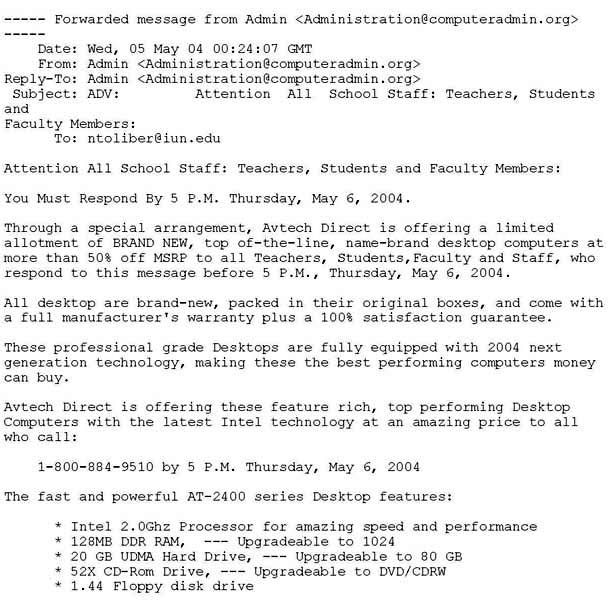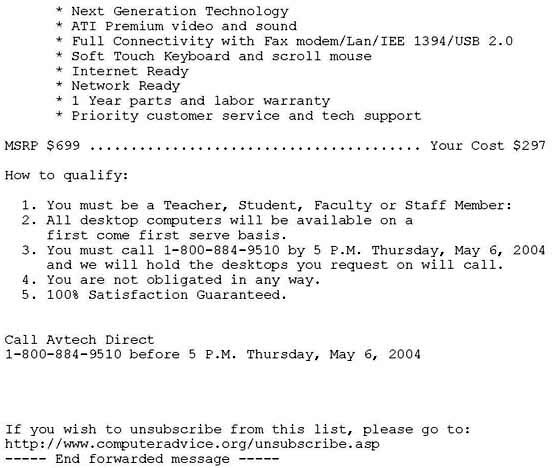

Story Author: IU Knowledge Base
Publish Date: Not Available
Source Publication:
http://kb.iu.edu
Recently an IU student was defrauded of several thousand dollars after receiving e-mail telling him he won the "Euro-America Sweepstake Lottery." UITS recommends that you ignore such messages which can be fraudulent attempts to gain personal information, such as account passwords or even credit card information. Never divulge such personal data in a reply, even if the sender looks legitimate; instead, forward the suspicious mail to the postmaster at the address where the message originated.
E-mail fraud has become very popular and it comes in many different forms. From advance fee scams like the "Nigerian bank scams" that offer a huge return for your help in securing a US bank deposit to "Pyramid scams" where you pay to join and get a return from those who join under you. To find out more information about fraud and how to report it, see the Knowledge Base document, "What is e-mail fraud, and what should I do about it?" at:
http://kb.indiana.edu/data/afvn.html
One way to protect your personal information and your funds is to minimize or alleviate receipt of these messages before they appear in your inbox. UITS offers a spam filtering service that can do just that. For more, see the Knowledge Base document, "At IU, how can I filter spam?" at:
http://kb.indiana.edu/data/alfb.html
In addition to this scam, and IUN student received an email offering a new computer at a very discounted price. Please disregard these messages as the authenticity of these cannot be verified. Indiana University and IUN have a special program through Dell, Apple, and CDW-G for faculty, staff and students. It is recommended that if you are in the market for a new computer that you visit the vendors that are in fact offering specials at http://computerguide.indiana.edu.
There are many fraudulent “deals” that may come through your email, we recommend that you delete these messages immediately. IU also offers filtering options that you may use for your email.
What is e-mail fraud, and what should I do about it?
There are many types of fraud, and e-mail is an inexpensive and thus popular method for distributing fraudulent messages to potential victims. According to the US Secret Service, millions of dollars are lost annually to fraud. Never respond to any message that asks you to send cash or personal information. You won't receive any riches, and in fact, you could get into legal trouble if you become involved with one of these scams.
Some of the most common fraudulent messages are non-monetary hoaxes or non-monetary chain mail. Treat these as you would spam; for more information, see the Knowledge Base document What should I do when I get spam e-mail? However, if you receive an e-mail message that appears to involve money, or asks for personal information, do not respond.
Below you'll find information about various types of e-mail fraud. If you receive any of these types of messages, you can report them to the Federal Trade Commission. To do so, forward the message with full headers to uce@ftc.gov . If a message of this type appears to come from a valid Indiana University address, forward it with full headers to IU's Information Technology Policy Office (ITPO) at it-incident@iu.edu .
Please look at the information shown below for a sample of the scams that have been sent to IUN faculty, staff, and students. These are screen captures of actual messages that have been received. If you receive one of these messages from an IU address, please click forward, do not change any information and send it to it-incident@iu.edu



